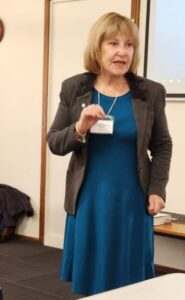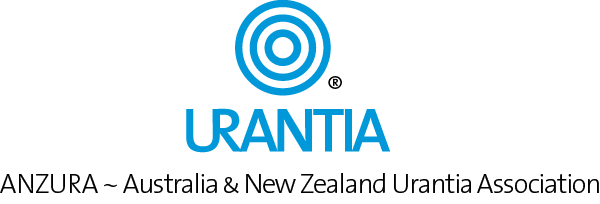(Presented at the 2023 conference in Sydney)

Good morning beautiful people, I’m Christine Bannigan. I’m retired and living the dream. I’ve faced life challenges, learned a lot about being human, and become a person that I’m now happy to be. In my working life I was an Industrial Psychologist, a Corporate Trainer, and… I lived with fear. Of course, I hid that with an overlay of extreme optimism.
In the year 2000 I was diagnosed with grade three cancer, and I walked away from my job. I was terrified about dying and I made a deal with God. I said, “If you let me live, I’ll make a difference for the future.” And, well, here I am.
Healing
To heal from the cancer, I worked with the allopathic model and embraced the alternative therapies; I was so drawn to the latter that I trained to become a practitioner of: Meditation, Neuro Linguistic Programming, Reiki, Electro Magnetic Energy Field Balancing, Massage, and Qi Gong healing.
This led me into a new career as a Complementary Therapist where I worked mainly with people who had been diagnosed with cancer. I had learned that at the foundation of every cancer is stress and an unresolved emotional issue (it had certainly been so for me). I worked with my clients to uncover and resolve their issues and began to make a difference for the future.
Books
During this time, I wrote three books: The Evolution Series. It was my way of sharing some of the inexplicable spiritual experiences I had been having since the day I was diagnosed. I toured both within Australia and overseas speaking, conducting sessions, and sharing my books. I worked that way for 12 years and in 2015 I retired for the second time and moved on to other things.
Toastmasters
I joined Toastmasters to have an avenue for sharing spiritual information (a little at a time) with the mainstream. I’ve been an active Toastmaster since 2015 and have held leadership positions at the Toastmaster’s Club at both area and district levels.
I still have a job that I do for a couple of months each year where I manage an administrative team for the NSW Educational Standards Authority. I do it because it’s making a difference for the future.
Interactive Exercises for Rapport Building
And now for the workshop section where you will be actively involved and will have the opportunity to share what you’ve experienced and observed.
The burning question is: Has your time come? If so, we’re here to support you in your communication so that you have the best possible opportunity to influence in a positive way.
We human beings are incredibly generous about sharing our passions, and we Urantia Book readers are particularly so because we recognise the unique gift held in its pages.
How then do we inspire others to embrace the teachings? How do we encourage them to take this and hold it in their hearts. For many of you, especially those who have studied Neuro Linguistic Programming, these exercises will be familiar – a reminder, a revision of what you already know; no harm in that. For others there may be a gem to take away.
One of my teachers used to say, “You will not be a successful communicator if you are unable to create rapport. You won’t get a decent sandwich if you are not in rapport with the cook.” Knowing how to build rapport will prove to be essential in creating meaningful relationships, influencing, and motivating.
You’ve probably guessed – we are going to explore the art of building rapport.
Who can tell me: what does it mean to be in rapport with another person? (audience interaction and acknowledgment)
This is not about pushing our own agenda. It’s about causing a shift – an opening – by understanding, accepting, and being emphatic, the way, I suspect, Jesus did.
Rapport Building
If you observe people who are in rapport, you’ll notice several common characteristics such as:
- They tend to address the other person by their name (although here in Australia “mate” seems to work well also.)
- They tend to make eye contact freely.
- They ask open-ended questions that give the other person an opportunity to share.
- They acknowledge the other person’s viewpoint using clauses like: I understand, I hear you, I can see that.
- They reflect back on what the other person has said e.g. “Are you saying that…” or “It sounds as though…” or “Talk about the murderer at BHP in Tasmania”.
- They match and mirror gestures, language, vocal pace, and breathing.
It’s a lot to think about I know. However, we do this naturally when you’re in rapport. You might be wondering: If we do it naturally why are we even talking about it? Surely we have it nailed! And we do… with some people. However… by mastering these techniques and being aware of them, it becomes possible to get along with, encourage, and influence people who we would otherwise find difficult, even impossible.
Let’s have a practice now. Two volunteers to demonstrate please… (Two people now sit facing each other.)
Please have a 1-minute conversation while maintaining eye contact and using each other’s name.
How did that go? (volunteers discuss their experiences)
Now ask some open-ended questions, perhaps using the five W’s: who, what, when, where, and why? Get to know the other person. Find out some things you didn’t already know.
Now let’s work in pairs to practice each of the behaviours described on the handout. Follow each exercise with feedback and discussion. (Participants talk in pair for several minutes then there’s general discussion on various experiences and observations.)
In closing, reaffirm that in order to influence others to read The Urantia Book, the first and most important step is to build rapport. Thank you all.

